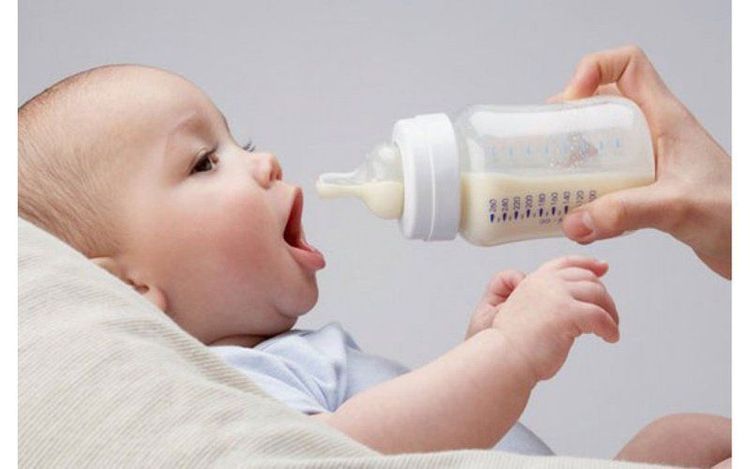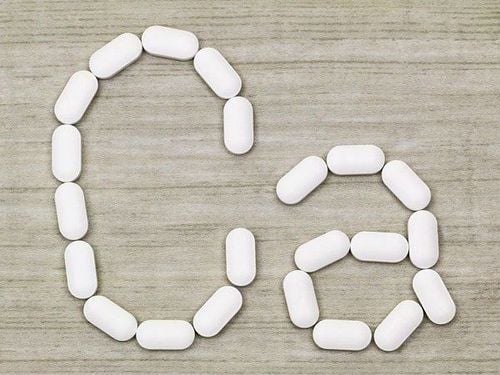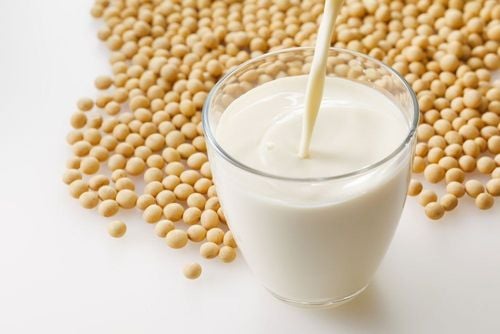This is an automatically translated article.
Milk has long been considered the main source of nutrients for young children. However, there are still many questions about the benefits and necessity of milk for toddlers. How much milk should be mixed for babies over 1 year old? Here is some information to help answer these questions for parents.1. How much milk should be used for children from 1 to 3 years old?
Currently on the beverage market, there are a variety of products advertised as delicious and nutritious for children, for example: fruit juices, water with electrolytes, and probiotic drinks. .. However, according to the American Academy of Pediatrics (AAP), water and milk are the two best drinks for young children.
Here is the recommended amount of milk for babies by month of age:
The AAP recommends the amount of milk for babies over 1 year old (from 12 to 24 months) should be about 2-3 cups (460-700ml) of whole milk per day . Children 2-5 years old should drink 2-2.5 cups (460-600ml) of low-fat or skim milk per day.
2. Why is milk beneficial for toddlers?
Many people wonder why mention of using whole milk for toddlers? Nutritionist Yaffi Lvova of Baby Bloom Nutrition in Phoenix, Arizona said: "Full cream milk is recommended for children 2 years of age and under because of the rich calcium, fat and protein content in this milk will help keep children healthy. Essential for the growth and development of young children. The recommended amount of milk also reflects a child's need for additional calcium, fat and protein during this time of rapid growth and development.”
In addition, this milk also provides vitamin D - combined with calcium to help strengthen bones in children. However, even high levels of vitamin D in milk may not necessarily make them fully absorbed, so fortification in different ways is also recommended by the AAP.
3. Potential problems when giving babies too much milk
Many parents seem excited about introducing whole milk into their toddler's diet, because it's an easy drink to drink and much less expensive than formula. However, anything too much is not good, too much milk can make children full, reduce appetite, no longer interested in food in meals.
On the other hand, consuming too much milk can interfere with your baby's ability to absorb certain nutrients. For example, too much calcium and casein (a protein in milk) can block iron absorption causing iron deficiency anemia. You can avoid these problems by limiting your baby's milk intake to the recommended 700ml per day.
In order for children to focus on drinking milk, experts suggest giving milk only at the table at mealtimes and only giving water between meals. Besides, parents can refer to how to choose infant formula from experts.

Lượng sữa cho bé theo tháng tuổi cần dựa trên nhiều yếu tố khác nhau
When can babies switch to low-fat or fat-free milk?
Full cream milk with high fat content, is the recommended drink for babies from 12 to 24 months. Usually, children can switch to low-fat or fat-free milk by the time they turn 2 years old. However, for some children with lower weight or other health problems, it may be advisable to use whole milk for longer.
On the other hand, if there is a family history of certain medical conditions such as heart disease, children under 2 years old may be advised by their doctor to use reduced fat milk (2%) to reduce the risk of cardiovascular problems . If you have any questions, consult your pediatrician about what is best for your baby, especially when switching from whole milk to any reduced or low fat milk.
4. Do toddlers really need milk?
Many parents may wonder: Do toddlers really need milk? This is not too strange for parents who intend to raise a child with a vegan lifestyle or the child himself has encountered problems such as milk allergy.
In fact, while milk is important, it is not a must-have for healthy growth and development. Although milk contains essential nutritional compounds that will help children under 5 years of age develop more comprehensively, in difficult times, many children have grown without milk. If your baby is allergic to cow's milk, you can tactfully meet your baby's nutritional needs in other ways.
Example: Calcium can be obtained through some vegetables, fats and proteins are found in many other foods. To make sure your child is getting the right amount of calcium and minerals, try offering them salmon, dark green leafy vegetables, or fortified cereals.
For added fats, nuts and nut butters, vegetable oils and butter are varied alternatives. Fish, meat, eggs and tofu all provide plenty of protein for kids who don't drink milk.
In general, if not for force majeure, experts do not recommend using other products to completely replace cow's milk. It's best to speak with a pediatric dietitian to find the best feeding solution for your child.

Cha mẹ nên hỏi ý kiến chuyên gia trước khi pha sữa cho bé
5. Establish a balanced diet for children
Milk is packed with great nutrients, but it's just one part of a healthy toddler diet. Just like adults, children this age require a balance of fats, carbohydrates, and proteins. When it comes to carbs, focus on complex types that will keep your child full and prevent constipation. Sources of these beneficial carbohydrates include:
Vegetables. Grains. Kinds of bean. In addition, you can add lean protein to your child's diet through fish, chicken, eggs and tofu. Vegetable oils, seeds, nuts, and nut butters (to a lesser extent, cheese and yogurt) are all good sources of healthy fats.
See more: What is a healthy diet?
As an adult, milk may not be your preferred source of nutrition, but for your toddler it is a highly nutritious food source recommended by pediatric experts. The amount of milk for babies by month of age is different, in which the amount of milk for babies over 1 year old is recommended from 2-3 cups per day to provide important nutrients to help promote healthy development of babies. .
Once they have a clear understanding of the appropriate nutrition in children of each age, parents should apply them to best ensure the physical and intellectual development of the baby.
Pediatrics Department - Vinmec International General Hospital is the address for receiving and examining diseases that babies and young children are prone to. To ensure quality, currently all examination and treatment procedures at the hospital are always performed by a team of doctors and experts with many years of experience, combined with a system of machinery and equipment. modern.
Thanks to good medical quality, parents can rest assured about the examination results as well as the treatment direction when consulted by the doctor.
Please dial HOTLINE for more information or register for an appointment HERE. Download MyVinmec app to make appointments faster and to manage your bookings easily.
Reference source: healthline.com












